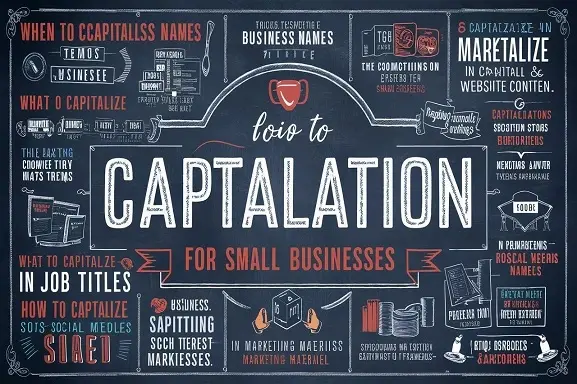When and What Should a Small Business Capitalize?

Small business owners are often very selective about large expenditures such as equipment and supplies, inventory, and facilities. But there are those expenses that in the long run may seem smaller, yet are cumulative. Knowledge of what is a capital expenditure in contrast to an operating expense is key to easy judgment for your business. In this blog post, we will explain what capitalizing expenses means and when it may be helpful for a small business to do so.
Capitalization of expenses is another issue that deserves a detailed explanation.
In the context of accounting, capitalization of an expense refers to the relative approach of a cost as an asset instead of an expense. Instead of taking the entire cost in the year in which you acquire the item and deducting it from your revenue, you divide the cost by the number of years that you estimate you will need that asset. This process is referred to as depreciation. Expensing assets when required also standardizes capitalization which results in a more accurate matching of expenses to the revenue earned from the assets in question.
The most common types of expenditures that small businesses capitalize are:
- Fixed assets such as manufacturing machinery, production vehicles, office furniture, and computers
- Buildings, warehouses, and major renovations such as constructing a new building or extending or remodeling a building.
- Patents; trademarks; and software copyright protection.
- Some of the commonly known and identifiable business start-up costs are as follows; incorporation fees, legal costs,
Debting these sorts of big, slow-moving assets also gives a better reflection of the net income of your business on the company statements. This is better than making one-time charges that directly impact the income statement as such expenses can be made over several years.
What Should Be Known Regarding the Rules on Capitalization?
There are plain rules from the IRS on which expenditure should be capitalized by businesses. In general, you must capitalize any expense related to acquiring or producing a tangible capital asset or significantly modifying a tangible capital asset in the year the expense is incurred. Tangible assets are distinct from intangible assets and are fixed assets that have physical substance as opposed to values such as goodwill and brand image. Common examples include:
- Tools and implements, vehicles and machines, office and shop fittings and furnishings
- Commercial property or commercial real estate, Business personal property, fixtures and fittings
- Vehicles, airplanes, boats
- These are the tangible assets used in the execution of computer-related functions such as the hardware and software systems used in computers.
- Duely, it owns land, mineral rights, and timber rights.
However, there are other expenses to be capitalized alongside the cost of acquisition or creation, which includes any amount expended on getting a definite asset ready for its use. Some of them are shipping costs, installation prices, sales tax, licenses, and testing costs.
Salamages of personnel, other overheads, and costs of repairs that are required to keep an asset in its current state are not permitted to be capitalized by the IRS.
That being said, let’s find out when it makes sense to capitalize:
However, aside from the legal aspect of it all as provided by the IRS, business owners need to apply some common sense to decide when capitalization is feasible.
Some reasons why capitalizing a purchase may be beneficial include:
- The useful life of the asset is over a year
- It expenses better, capitalizing the expenses more with revenues.
- It makes it possible to disseminate an expensive asset in a certain timeframe.
- The business funded the acquisitions (to be in line with the loan repayments).
- This tax asset can be expensed for bonus depreciation tax deductions
Conversely, an asset that may have been acquired for a token amount can be insignificant to warrant the time and effort to input into your records. Determine a dollar value that can be negotiated based on the operations of your business. It enables you to capitalize big expenditures for expensive assets while writing off small expenditures for simple items.
Putting in Place Your Accounting Framework
Any capitalized assets require the proper setting up of your accounting system to have specific accounts to hold these purchases for the long term. Common accounts used include:
- Property, Plant & Equipment – The account takes care of the overall fixed asset record.
- Accumulated Depreciation - This shows the total amount of depreciation that has been charged over time.
- This income statement account is influenced by yearly depreciation impacts.
You should consult your accountant or software to set up these and other accounts based on your business.
Consistency Matters
But in the case of using capitalization and depreciating, it is strongly recommended that whatever form is used should be constant year after year. You should apply the same rules about capitalizing versus expensing, should you acquire similar assets. Frequent fluctuations from one tax year to the next may attract the attention of the IRS.
Work with Your CPA
As you noticed, capitalization affects your tax return and financial statements; therefore, engage your CPA in big purchases. They can give you insights into new changes in IRS rules and regulations and some of the guidelines followed when doing accounting. It is however important to ensure that you plan for these purchases in advance to make sure that they are best for your business both in the books and on tax.
Proper identification of fixed assets and estimation of expenses is imperative for the proper assessment of the company’s profit margin. By adhering to the required rules as per the IRS and what is practically feasible while deciding on when and what to capitalize, you can present financial statements that will be informative regarding your company’s performance. consult your accounting practitioner for assistance in implementing these capitalization guidelines in your small business.
Contact us here for Small Business Accounting services now!
